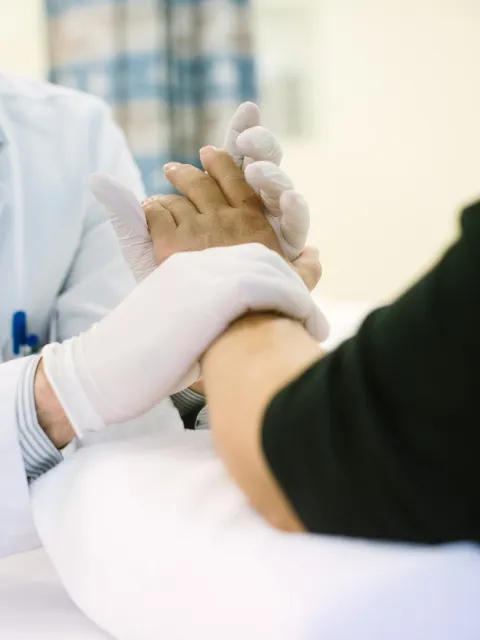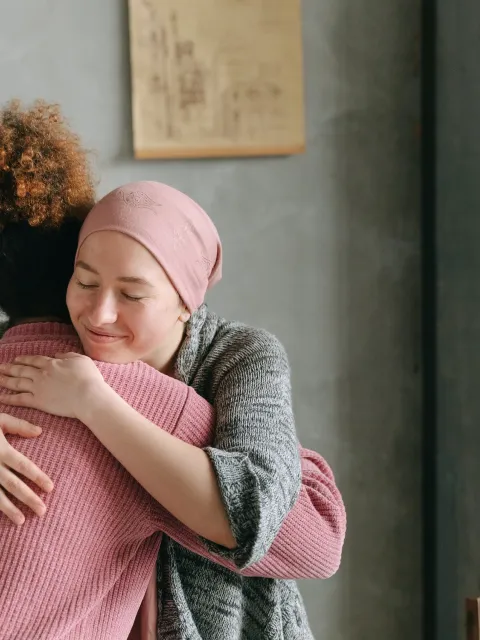Cancer beyond COVID-19: reimagining cancer screening and diagnosis
The first UICC Virtual Dialogue in the series dedicated to the changing landscape in cancer care due to COVID-19 addressed service disruptions in screening and diagnosis caused by the pandemic and suggested innovative solutions and practices crucial to saving lives.

The disruption to cancer care during the coronavirus pandemic risks causing a “ticking timebomb” of undetected cancers, with all the implications for worsening patient outcomes and diminished health resources.
UICC has therefore initiated a series of three Virtual Dialogues aimed at exploring how cancer organisations, including medical practitioners, treatment centres and patient support groups, are adapting and can innovate in response to this situation.
"The suspension of critical cancer services is likely to be far more severe than the consequences of COVID-19 itself."
– Dr CS Pramesh
On Tuesday 3rd November, the first Virtual Dialogue focused on “Reimaging cancer screening and diagnosis”, as detecting and diagnosing cancer early offers patients the greatest potential for cure, with fewer side effects and often at lower costs. It looked at how members and the wider cancer community have adapted to the situation to minimise the impact of disruptions, and what innovations are emerging for screening services and diagnostic work during COVID-19 and beyond.
The panel consisted of Amy Israel, Vice President and Global Head, Oncology Policy & Healthcare Systems, at Novartis; Jodie Moffat, Head of Early Diagnosis, Cancer Research UK (CRUK); Erika Nicholson, Director of Screening, Canadian Partnership for Cancer; and Dr CS Pramesh, Professor, Thoracic Surgery, Department of Surgical Oncology and Director at Tata Memorial Hospital and UICC Board Member. It was chaired by Dr Sonali Johnson, UICC’s Head of Knowledge, Advocacy and Policy.
Restoring patient confidence
While national and regional challenges differ to a degree, the panellists evoked a similar nature of disruption to cancer care in their respective countries. They all spoke of drastic reductions if not a complete halt in screening services and deferral of diagnostic work, creating a backlog of unmet demand; lack of capacity and diverted resources, with many staff taken from their usual area to assist with COVID-19 cases and in India, cancer centres being used as COVID-19 treatment facilities; a confusion about what to prioritise in terms of treatment; the impact of the spread of COVID-19 among health workers; and the logistical challenge posed by measures taken to fight the spread of coronavirus (confinement, social distancing).
“On one hand we had to balance the need of continuing cancer treatment for our patients, but at the same time we needed to ensure their safety as well as that of our employees. But we realised that several thousands of lives would be lost if we prioritised COVID-19 to the exclusion of everything else.”
– Dr CS Pramesh, Professor, Thoracic Surgery, Department of Surgical Oncology and Director at Tata Memorial Hospital
After the initial surge of the pandemic, very quickly it became apparent that cancer care, including screening and diagnostic services, must not be seen as “elective” and efforts were made to ensure that cancer care was given the attention and importance it required by getting cancer screening, early diagnosis and treatment up and running again.
In India, for instance, Dr Pramesh said that health organisations were mobilised to issue principles for treatment and screening, with practitioners seeking to disseminate reliable information through publications and education sessions, organising webinars and communicating the essential nature of screening services to the public. In the event of a positive diagnosis, patients and their families were provided with the assurance that they would receive proper care.
In Canada, the health community came together over the summer to craft a guidance document on managing cancer screening during COVID-19 to build resilient, safe and equitable services, according to Erika Nicolson. The aim was to utilise screening programme data to inform capacity planning when faced with constrained resources, build greater cancer awareness on the importance of screening, ensure that inequalities between populations were not exacerbated, support healthcare providers and people receiving care, and implement infection prevent and control practices.
Erika Nicholson highlighted the case of indigenous populations in Canada and said that "the pandemic has brought the harsh realities of inequities and the social determinants of health front and centre. In Canada as in many other parts of the world, communities most impacted by COVID-19 are in many cases those communities traditionally underserved.”
All panellists cited patient confidence as a key factor in the difficulties of resuming screenings and diagnostic services. “It's not that there were no longer any cancer patients, it’s just that they were no longer showing up at the care centres,” said Dr Pramesh.
“Fewer patients are actually consulting their primary care physician and taking the tests that they are being recommended. It might be that patients are concerned about getting COVID-19. They might be concerned about overwhelming the health system. And it might be that there's this idea that the window of opportunity to treat cancer is bigger.”
– Jodie Moffat, Head of Early Diagnosis, Cancer Research UK
The silver lining: what organisations have learned from COVID-19
Not only cancer organisations but entire national health care systems have had to adapt to the pandemic. This has accelerated decision-making processes and exponentially increased the rate of innovation, particularly in the areas of video conferencing and telemedicine. Panellists all agreed that there were lasting evolutions that would benefit health provision in the future, including cancer care.
Jodie Moffat said that while the move towards digitalisation is serving some populations very well in the UK, it may be disserving others, such as older patients who are also proving less likely to come forward for screenings and diagnosis, despite public campaigns to increase people’s confidence in seeking care.
She is encouraged, however, at how adaptable the system for service delivery has been and how rapidly guidelines have been developed to address gaps in knowledge and information. “We can do the same for cancer,” she said. “We need to harness this appetite, this energy, this enthusiasm. We need to keep our mind focused on the long-term vision of providing patients with improved outcomes, and get the systems and services back up and running, while giving patients confidence in these services.”
Erika Nicolson highlighted areas of focused innovation, including the ability to offer quality screening closer to home by moving from Papanicolaou (Pap) testing to HPV-based screening for cervical cancer and supporting direct mail of self-sampling tests. Accelerating the transition to HPV primary screening, she said, requires fewer interactions with the healthcare system and opens up the opportunity for self-testing, where women collect their own sample for HPV testing.
“As screening programmes restart, it is important that we understand who is returning to screening and who is not. We need to reach the underscreened and be mindful of new inequities that might be emerging. For this, we need to work with communities to understand what would enable culturally safe and equitable participation as well as a successful uptake of proven innovations like HPV testing. COVID-19 invites us to conduct a critical review of our systems and programmes and to rebuild in a better way.”
– Erika Nicholson, Director of Screening, Canadian Partnership for Cancer
Dr Pramesh also expressed the view that there was plenty to learn from COVID-19. He cited the rapid development of infection prevention and control, international and interdisciplinary collaboration and the translation of tele- and video-consultations into treatment.
He said it was important to sustain the momentum of these positive adaptations and maintain practices to contain COVID-19 in terms of masking, regular disinfection and physical distancing, so that early detection, diagnosis and treatment for cancer can continue.
“There’s a big role for precision medicine to play in stratifying patients into risk categories. If we can understand the risk profile of patients, we can adjust screening programmes to take those risks into account, assure people that it is safe to come for screening and catch cancers as early as possible.”
– Amy Israel, Vice President and Global Head, Oncology Policy & Healthcare Systems, Novartis
Amy Israel of Novartis said that the advanced technology developed through precision medicine should be used to understand patients’ risk profiles better, enabling less invasive approaches that can be done at home to preserve distancing as much as possible and take the pressure off clinical staff.
She emphasised along with the other panellists, however, that any adaptations must be widely accessible. It is therefore important to understand what kind of adjustments need to be made to ensure that these adaptations (such as digital screening) are inclusive of disadvantaged communities and not discourage their participation.
Finally, she said that is paramount for the cancer community to seize the moment offered by a new public awareness of prevention and understanding of the purpose of screening to promote participation in cancer screening through an “opportunistic piggybacking” on other programmes. “The barriers to cancer screening – convenience, fear, affordability, complexity of the process, time – are similar to the coronavirus screening experience. People are willing to be screened for COVID-19 and we can harness that to drive participation in cancer screening, making sure that communication around results is timely, responsive and easily understood.”
To read more about the Cancer beyond COVID-19 series and register for upcoming sessions, visit UICC's dedicated webpage.
You may also read about the experiences and responses of UICC member organisations to the pandemic and access past Virtual Dialogues on cancer and COVID-19 at “UICC’s response to COVID-19.”
For more information on cancer care during the coronavirus pandemic, visit UICC’s "Cancer and coronavirus resources" page.
"The suspension of critical cancer services is likely to be far more severe than the consequences of COVID-19 itself."
– Dr CS Pramesh
Last update
Thursday 06 May 2021
